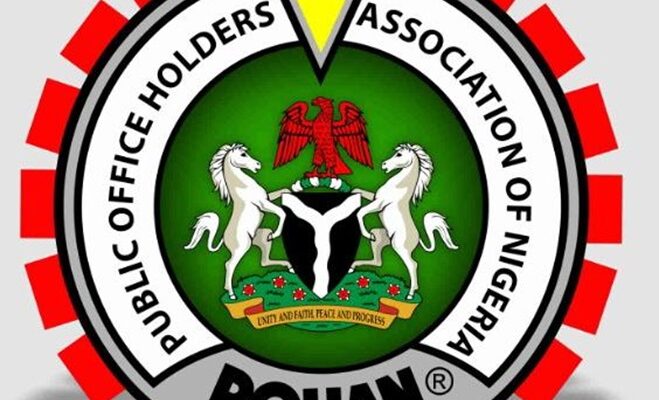By: Rademene Asonye
In a nation where cynicism toward public office has hardened into habit, the emergence of the Public Office Holders Association of Nigeria (POHAN) offers a welcome ray of hope — a reminder that public service, when rightly understood, remains the highest form of patriotism.
Founded in February 2020 by Bashorun MD Eseyin, POHAN was conceived as the umbrella organization for all public office holders across Nigeria. In just five years, the Association has grown into a credible and reform-minded body, promoting integrity, patriotism, and efficiency in the Nigerian public sector. Its founding vision is bold: to rebuild a public service anchored on ethical values, professionalism, and an unwavering commitment to the common good.
A Vision Rooted in Patriotism
The idea behind POHAN is not bureaucratic convenience but moral necessity. For decades, Nigeria’s public institutions have suffered from a deficit of trust. The civil service, once the pride of the nation, has in many respects become synonymous with inefficiency and neglect. Against this backdrop, Bashorun Eseyin’s initiative stands out as a deliberate effort to restore dignity and discipline to governance.
Eseyin, who serves as the founding President, envisioned POHAN as both a unifying and reformative platform — one that brings together office holders from all tiers of government under a shared ethos of service. His mission is clear: to rekindle the flame of patriotism in those who carry the burden of public responsibility and to remind them that leadership, at its core, is stewardship.
Partnerships that Empower and Reform
POHAN’s growing influence can be measured not only by its vision but by its partnerships. In collaboration with the Office of the Secretary to the Government of the Federation (OSGF), the Association has organized capacity-building and ethical reorientation programs designed to instill patriotism and efficiency in public servants.
Similarly, its partnership with the Association of Local Governments of Nigeria (ALGON) reflects a recognition that reform must begin at the grassroots. By promoting ethical standards and accountability among local government leaders, POHAN is ensuring that good governance is not confined to the corridors of Abuja but reaches the communities where citizens live and work.
Through these alliances, POHAN has demonstrated that systemic change is achievable when institutions cooperate on shared values rather than political convenience.
A Platform of Credibility and Influence
POHAN’s activities have continued to attract an impressive array of national and international dignitaries. From Senator George Akume, Nigeria’s Secretary to the Government of the Federation, to global figures such as Sir Clyde Rivers and leadership advocate Dr. Sam Adeyemi, POHAN’s programs have drawn attention from leaders across sectors.
Federal Ministers, Governors, Senators, and Members of the House of Representatives have all participated in its events, lending both political and moral validation to its mission. This diversity of support speaks to a growing consensus that Nigeria’s governance challenges cannot be solved by legislation alone — they require a moral and institutional renewal within the public service itself.
Institutionalizing Integrity through Public Service Day
In furtherance of its reform agenda, POHAN has resolved to commemorate the United Nations Public Service Day annually — a symbolic but significant commitment. This global observance, which celebrates the value and virtue of public service, aligns perfectly with POHAN’s goal of recognizing and rewarding excellence in governance.
By observing this day, POHAN is institutionalizing a culture of reflection and accountability — reminding office holders that their ultimate measure is not tenure or title, but impact and integrity.
The Case for National Support
POHAN’s progress so far is commendable, but its success should not be left to the vision of a few. Reforming the Nigerian public service requires collective will — from policymakers, institutions, and the citizenry alike. Ministries, departments, and agencies must align with POHAN’s training and ethical programs, while civil society organizations and citizens must engage constructively in holding public officials accountable.
Public trust is not rebuilt overnight; it is earned through consistent, transparent, and selfless service. POHAN is laying the foundation for that transformation, but its work must be sustained through national support and institutional collaboration.
A Model for Ethical Leadership
In a country often accused of lacking role models in governance, POHAN is quietly producing them. Its emphasis on continuous learning, ethical reform, and patriotic leadership provides a replicable model for other professional associations. Bashorun Eseyin’s brand of leadership — disciplined, visionary, and inclusive — reminds Nigeria that transformation does not begin with policy pronouncements but with personal conviction and institutional courage.
Restoring Dignity to Public Office
The true test of governance is not in grand rhetoric but in service that transforms lives. By promoting accountability, ethical conduct, and professionalism, POHAN is helping to redefine what it means to hold public office in Nigeria.
Its message is as clear as it is urgent: public service must once again become a noble calling — one rooted in sacrifice, patriotism, and genuine concern for the people.
Nigeria’s journey toward reform may be long, but with institutions like POHAN leading the charge, there is hope that the public sector can regain its lost integrity and purpose. Bashorun MD Eseyin and his team deserve commendation for daring to believe that a public service that works for all Nigerians is not a dream — it is a duty.
– Dr. Rademene Asonye, MNIPR
President, Female Journalist Network, Nigeria




